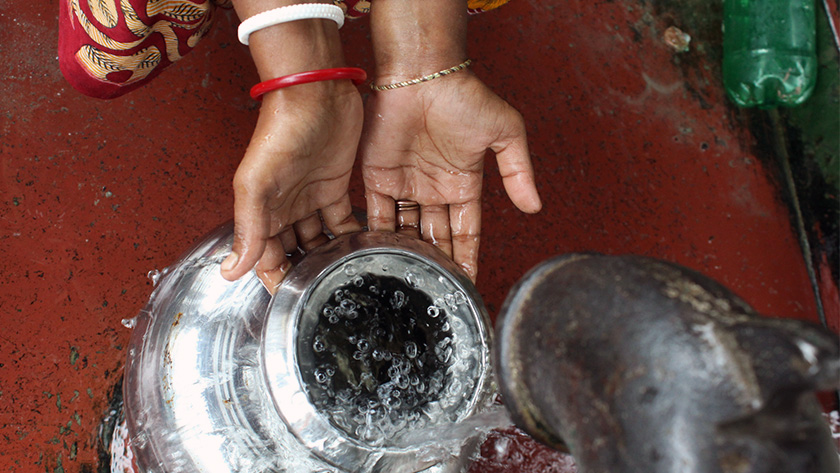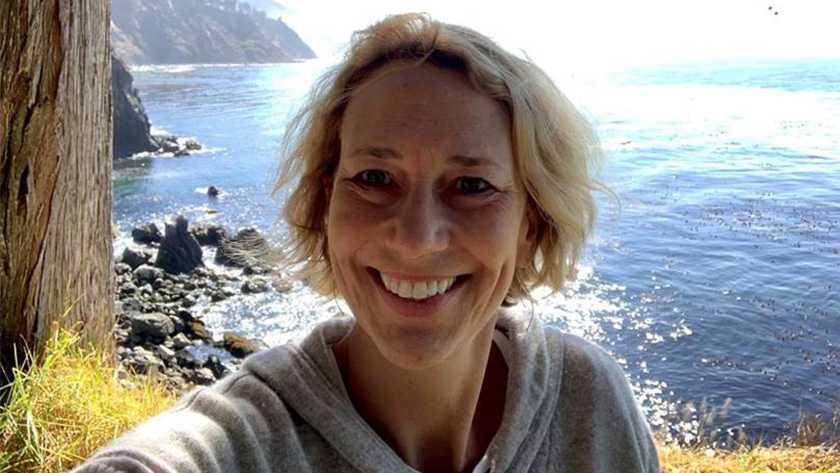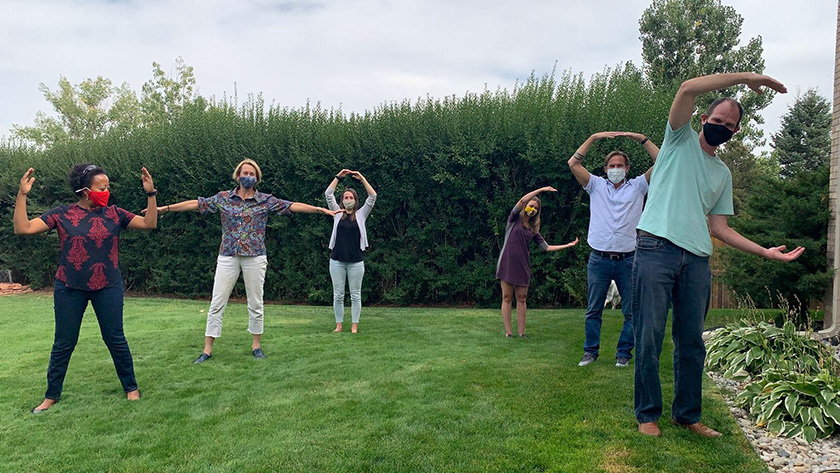If you could track my radius of movement since March 2020, I bet 98 percent of my footsteps were in my house. At first my new and small world DC (during COVID) was claustrophobic and oppressive. I felt I was under house arrest, “confined” to my home after years of freedom globetrotting for work and pleasure. Yet humans have the uncanny ability to adapt to new situations. Nine months after we closed the office in Denver and I started working from home “for a few weeks,” I have gained a different perspective on my life.
Today my travel radius DC continues to be small, but life does not feel small. In fact, I feel that personally this pandemic has been expansive for me on the inside. I am a better person. A better mom, partner, boss, leader, colleague, and friend. I credit this to my ability to put into practice what I have learned from the WellBeing Project inner development program (IDP). 2020 has been a bit of a burning platform at work and in life. I suppose I have always worked better under pressure (well, not too much pressure) yet this year was extreme.
In the past, I have been on various teams that espoused the “positive tension” model for team dynamics to thrive—enough tension to energize a team but not too much to kill it. It was a stressful approach to teambuilding. I prefer to focus on conscious leadership and have been applying this approach with my Senior Leadership Team (SLT) at Water For People. This means practicing agile team dynamics to address and resolve issues quickly, as they arise, and active appreciation of each other.
In tandem with an openness to discuss our own personal wellbeing challenges, conscious leadership has been effective to get the best out of us as an SLT. I can truly say we have become a high-functioning team even with all the pressure and tension in the world around us in 2020. We try to stay “above the line” with each other by being curious and open to issues, realigning our thoughts before we respond, and taking actions that reflect our highest selves. It is not easy. Yet we have shown each other we can do it when we create a collaborative and supportive environment within our own team.
I’ve reflected here on a few examples of our growth as a SLT and my growth as the leader of this team:
I have come to believe that embracing wellbeing as an intrinsic part of life and work is beneficial for leaders, their employees, and their families. If leaders thrive, organizations thrive. At Water For People, we have looked at all the craziness of 2020 as an opportunity to reframe our thinking of who we are and how we work. Not only how we work during a global pandemic, but how we work as a northern–led international NGO working in the Global South. We have made space to digest and unpack Black Lives Matter, social unrest, and the movement for racial justice.
 Collection at a Water For People tap in rural India
Collection at a Water For People tap in rural India
In response, we are actively working on decolonizing our organization and shifting more decision-making power to our operating countries and leaders in the Global South. To change the water and sanitation systems in which we work to be more sustainable, we must also change ourselves to be more sustainable.
I rebuilt my SLT during the crises of 2020. I didn’t plan it this way, but I rolled with it. High uncertainty has a high chance to lead to disaster. Even the best teams unravel when push comes to shove. In our case, these external forces led to team cohesion. We needed to quickly build trust with each other, make critical decisions that affected the future of the organization and our employees like cost cutting to make up the fundraising gap and restructuring to respond to organizational needs. We needed to communicate often and transparently with our employees and our board.
Coincidentally, the day we closed the office in Denver due to COVID was the same day we started our SLT team coaching program with Julianna Christie from Crafted Leadership. We had hired Julianna a few months prior as I knew our team would be undergoing some major changes. I wanted support from a team coach so we could form bonds and perform as a high performing team as quickly as possible. Julianna was extremely helpful to us as we tackled the challenges one by one that COVID hurled our way.
We grew as a team in terms of vulnerability, trust, and collaboration. Our quarterly employee engagement pulse surveys have provided data that we have more credibility as a team today than we did a year ago. We act and feel more like a team than we were in March 2020. And we are definitely a stronger team today than we were a year ago.
The Wellbeing Project espouses kindness, vulnerability, connection, and community as foundations for social change. When I joined the IDP, I intentionally set out to work on these characteristics in myself. At our first IDP session in the spring of 2018, I made a commitment to myself, and to my IDP cohort, to “open my heart” more to my colleagues and people I do not know well to build stronger connections. I have been working on that diligently ever since with my IDP cohort, with my teammates at Water For People, and with many others in my life.
 Eleanor Allen, CEO of Water for People, at Esalen in Big Sur, California for her WellBeing Project cohort retreat
Eleanor Allen, CEO of Water for People, at Esalen in Big Sur, California for her WellBeing Project cohort retreat
Today, I truly feel we have good balance in our performance as a SLT. Yes, there are good weeks and bad weeks for each of us. Some days a few of us may be up while others are down. Yet we are a team and a safety net for each other. We have confidence in each other and can share where we are personally at any moment without fear of repercussions: what is in our head, our heart, and on our plate.
When we take the time to reflect on these three simple questions before we dive into a meeting agenda, we are more effective as a team because we can support each other better. This vulnerability brings us closer together. We also have fun. We laugh, we cry, we vent our anger and frustration, and we celebrate our shared achievements and our happiness.
One of the lower scores on our organizational employee engagement survey in 2019 was creativity. As a Senior Leadership Team, we weren’t sure how to tackle this one. What was the root of our stifled creativity at Water For People and how could we change it? COVID pushed us forward into unknown territory at warp speed. Crisis brings opportunity. We quickly had to become more creative with our internal communications as a virtual organization, pivot from physical fundraising events to digital ones, and determine how to measure our progress in the field if we could not do our annual monitoring with door-to-door surveys.
 Water for People’s SLT at a socially distanced meeting, trying to spell “coconut” without a colleague in the UK who would have contributed the missing letter
Water for People’s SLT at a socially distanced meeting, trying to spell “coconut” without a colleague in the UK who would have contributed the missing letter
To spark our creative spirit, we have looked to incorporate new ways of working into our culture. This includes doing “sprints” to quickly test ideas to support our government partners, developing a new 10-year organizational vision, creating new fundraising products, and selecting sanitation scaling opportunities to move forward. One of my favorite activities is setting aside time on Friday mornings for generative discussions with the SLT on future-focused topics. We call these Future Fridays. Lastly, we are celebrating birthdays and work anniversaries virtually, playing online group games, and having silly competitions (e.g., lip synching, GIF wars, costumes, etc.). I believe we are more creative as an organization now than ever before.
In becoming more comfortable with myself through my inner-work, I feel that I can see situations, analyze them, and do my best to resolve them without getting too drawn in. It is hard to explain, but I now feel I can remain calm and look at the situation from above, which allows me to think more rationally and make sounder decisions. I feel untethered, like in Michael Singer’s book The Untethered Soul, and really do believe I have been able to remove some of my internal blockages and put an end to habitual thoughts and emotions that have historically held me back. I can silence the incessant chatter in my mind—or at least tone it down. I can’t say I am successful at doing this all the time, but I can say I have improved over the past 18 months.
My regular practices of meditation and mindfulness have also helped me tremendously to maintain peace of mind. This improves not only my personal attention and accountability to my tasks, but also to my team. In any situation, the parties involved have a responsibility to do what they each agreed to do—100 percent. I am much better at sticking to the 100 percent and not doing more (my tendency), and in calling attention (in a respectful way) to those that do less than their 100 percent. This is one of our practices as a SLT. We are more productive as a team when we follow these agreements.
My personal growth over the past 18 months is greatly attributed to the WellBeing Project. Being part of the IDP cohort of 24 leaders from 20 countries has been an incredible journey. Our self-discovery, vulnerability, and quest for our own inner wellbeing is rooted in our desire to be stronger leaders for social change and have a greater influence on how social change happens.
Research has shown that improving leaders’ personal wellbeing reduces burnout, enhances resiliency, and increases trust and open-mindedness for entire organizations. This has a ripple effect throughout the organization, including more openness to diverse perspectives and greater collaboration.
The tools I have learned through the Wellbeing Project have helped make me a better leader. I have integrated various wellbeing practices into my daily life—practices I was not even aware existed 18 months ago. Even though 2020 has been an incredibly difficult year, I am grateful that I have good mental health, high life satisfaction, much love around me, a strong community, a sense of meaning and purpose, and am able to manage my stress so that I can be an effective leader. What more could I ask for?
Want more stories of transformational change on the world’s most pressing problems? Sign up for Skoll Foundation’s monthly newsletter.